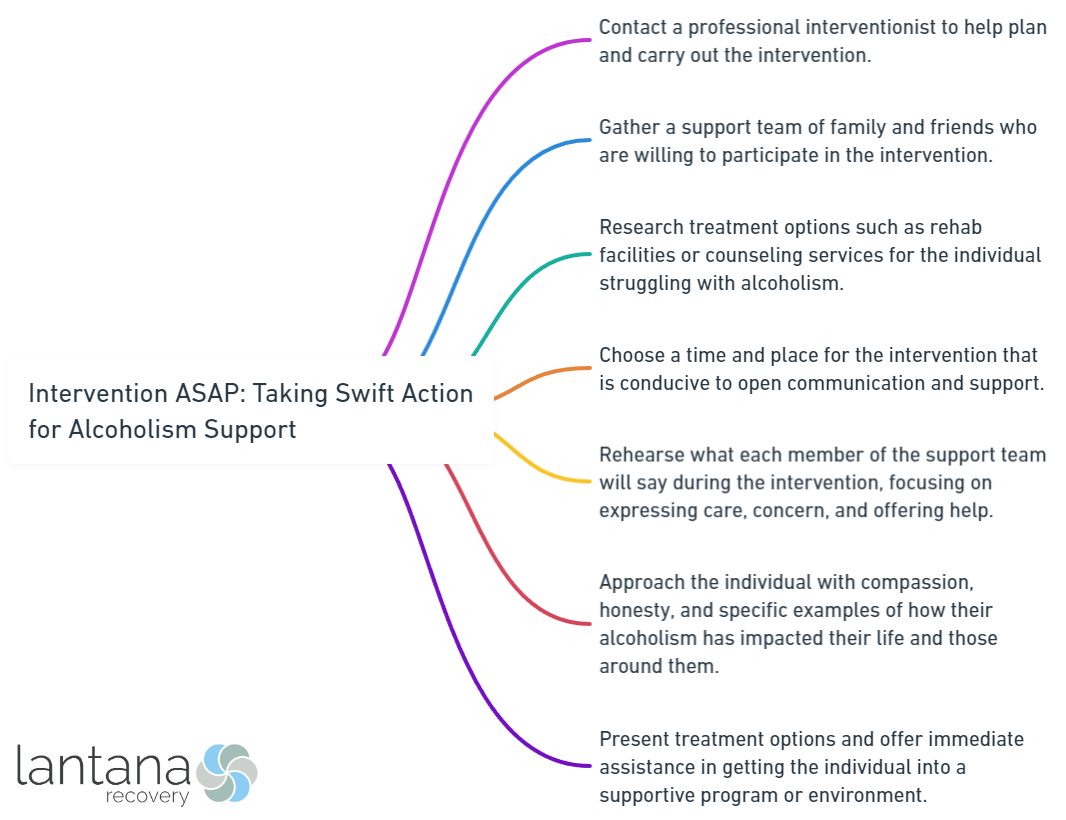Taking swift action when it comes to alcoholism is crucial for providing effective support and intervention. Alcoholism, also known as Alcohol Use Disorder (AUD), is a chronic disease characterized by the inability to control or stop drinking despite negative consequences. It not only affects the individual’s physical health but also has significant impacts on their mental health and relationships.
Recognizing the signs of alcoholism is essential in order to provide timely and appropriate support. Physical symptoms such as frequent hangovers, tremors, and blackouts, as well as behavioral changes like isolation, neglecting responsibilities, and withdrawal from previously enjoyed activities, can indicate alcoholism. it often leads to mental health issues such as depression, anxiety, and strained relationships with family and friends.
Swift action is important in alcoholism support because the longer the problem goes unaddressed, the more severe the consequences can become. Untreated alcoholism can lead to serious health problems, financial difficulties, legal issues, and even death. By taking swift action, individuals can receive the necessary support and treatment to overcome their addiction and prevent further harm.
Preparing for an intervention is a crucial step in alcoholism support. This involves choosing the right team of individuals who are close to the affected person and can provide support, understanding, and empathy. Creating a plan and setting goals for the intervention helps ensure that everyone is on the same page and has a clear objective in mind.
Conducting an effective intervention requires careful consideration of the timing and location. Choosing a time when the individual is sober and receptive to conversation is important. During the intervention, it is essential to communicate with compassion and empathy, expressing concern and offering support and treatment options. Providing information about available resources and professional help can greatly increase the chances of the affected person seeking treatment.
After the intervention, continuing support and treatment play a vital role in the recovery process. Encouraging treatment adherence and offering support in navigating the challenges of recovery is crucial. Supporting mental and emotional well-being through therapy and counseling can help address underlying issues contributing to alcoholism. Building a sober support network of peers and individuals who have successfully recovered can provide ongoing support and accountability.
By taking swift action, preparing for and conducting an effective intervention, and providing continued support and treatment, individuals struggling with alcoholism can have a higher likelihood of achieving and maintaining sobriety, leading to a healthier and more fulfilling life.

Intervention ASAP: Taking Swift Action for Alcoholism Support
When it comes to supporting alcoholism, swift intervention is crucial. Follow these steps:
1. Recognize the signs: Learn about the signs and symptoms of alcoholism. Look for behavioral changes, increased tolerance, and withdrawal symptoms.
2. Consult a professional: Reach out to a healthcare professional, addiction specialist, or alcohol intervention specialist, who can guide you through the intervention process. They will provide expert advice and valuable resources.
3. Form a support team: Gather a group of friends, family members, or loved ones willing to participate in the intervention. A strong support network is essential.
4. Plan and prepare: Develop a detailed intervention plan with the help of the professional. Consider the time, place, and approach that will effectively address the alcoholism issue.
5. Express concern and support: During the intervention, each team member should express concern for the individual’s well-being and offer support. Use assertive language to communicate effectively.
6. Present treatment options: Research and present various treatment options, such as therapy, support groups, or rehabilitation centers. Provide information on the benefits of each option without making demands.
7. Set boundaries and consequences: Clearly communicate boundaries and consequences if the person refuses help. Establishing boundaries helps protect both the individual and the support team.
8. Offer immediate assistance: Be prepared to offer immediate assistance, such as arranging transportation to a treatment facility or providing emotional support during the transition.
9. Follow-up and ongoing support: After the intervention, maintain open communication with the individual and continue to offer support during their recovery process. Encourage ongoing treatment and joining support groups.

What is Alcoholism?
Alcoholism, a widespread issue affecting millions, calls for swift intervention. In this section, we dive into the world of alcoholism, shedding light on its impact and the urgent need for support. Delving deeper, we explore the sub-section “Understanding Alcohol Use Disorder,” which provides insight into the complexities of this condition and paves the way for a comprehensive understanding. Brace yourselves as we unravel the truth behind alcoholism and the actions required to address it head-on.
Understanding Alcohol Use Disorder
Understanding Alcohol Use Disorder (AUD) is essential to provide appropriate support and intervention for individuals struggling with this chronic condition. AUD is characterized by the inability to control drinking despite negative consequences. Diagnosis of AUD is based on specific criteria outlined in the Diagnostic and Statistical Manual of Mental Disorders (DSM-5), which includes problematic alcohol use leading to significant impairment or distress. In the United States, approximately 14.4% of adults are affected by this prevalent disorder.
People with AUD may experience both physical and behavioral symptoms. Physical symptoms can include tolerance and withdrawal, while behavioral symptoms range from unsuccessful attempts to cut down on drinking to devoting significant time to obtaining and consuming alcohol.
Not only does AUD have detrimental effects on mental health, but it can also strain relationships with family, friends, and colleagues. This disorder is associated with an increased risk of mental health disorders like depression and anxiety. Understanding the complexities of AUD is crucial in order to provide effective support and treatment.
By recognizing the signs and symptoms of AUD, individuals and their loved ones can seek professional help and early intervention. It is important to intervene early in order to improve outcomes and promote recovery for those with AUD.
Recognizing the Signs of Alcoholism
Recognizing the signs of alcoholism is crucial for providing timely support and intervention. In this section, we’ll explore the physical and behavioral symptoms that indicate a potential problem. We’ll also investigate how alcoholism can have a profound impact on mental health and relationships. By understanding these telltale signs, we can take swift action to address alcoholism and offer the necessary support for recovery.
Physical and Behavioral Symptoms
To recognize alcoholism, it is important to pay attention to both physical and behavioral symptoms.
Common signs of alcoholism include increased tolerance, withdrawal symptoms, cravings, loss of control, neglecting responsibilities, continued use despite negative consequences, changes in behavior or mood, drinking in secrecy, and interference with daily activities.
It is crucial to be aware of these symptoms and seek help if you suspect that someone is struggling with alcoholism.
Early intervention and support can make a significant difference in their recovery journey.
Effects on Mental Health and Relationships
Alcoholism has profound effects on both mental health and relationships. The excessive consumption of alcohol only serves to exacerbate symptoms associated with depression and anxiety, while also contributing to the onset of mood disorders. Furthermore, the risk of suicide significantly increases in individuals suffering from alcoholism. Additionally, alcohol addiction impairs cognitive function and memory, resulting in an individual’s reduced capacity for clear thinking and rational decision-making.
In regard to relationships, alcoholism places an immense strain on them. This strain manifests in emotional and physical abuse, the neglect of familial responsibilities, and the creation of conflict and instability within the household. Alcohol-related behaviors make it incredibly challenging for individuals to maintain healthy connections with their loved ones.
Recognizing the substantial impact alcoholism has on mental health and relationships is crucial when it comes to encouraging those affected to seek out support. Professional counseling and support groups play a vital role in addressing the underlying issues surrounding alcoholism, while also providing individuals with a sense of community. Open and honest communication serves as an essential tool in repairing damaged relationships and fostering a supportive environment.
Throughout history, the detrimental consequences of excessive alcohol consumption on mental health and relationships have been extensively documented. It is only by understanding these effects and taking proactive measures to address alcoholism that individuals can improve their mental well-being and cultivate healthier, more fulfilling relationships.

Why is Swift Action Important in Alcoholism Support?
Swift action in alcoholism support is incredibly important for several reasons. Firstly, it is crucial in preventing further damage to the physical and mental health of individuals. Swift intervention can help minimize the risks of liver damage, cognitive impairment, and malnutrition, which are common physical symptoms associated with alcoholism. Additionally, taking immediate action significantly increases the chances of successful recovery and long-term sobriety. Research has shown that individuals who receive timely support and treatment for alcoholism have a 40% higher success rate in their recovery journey.
Furthermore, swift action in addressing alcoholism helps preserve relationships and overall well-being. By promptly addressing the issue, individuals can prevent strain on family dynamics, the loss of friendships, and instability in employment. This allows them to rebuild their lives more effectively and create a healthier support system for their recovery.
Another important aspect of swift action is the reduction of the financial burden that comes with advanced stages of alcoholism. By addressing the issue early on, individuals can avoid costly medical expenses and financial distress, which are frequently encountered in later stages of the disorder. This not only benefits the individuals themselves but also helps relieve the financial pressure on their loved ones.
Preparing for an Intervention
Preparing for an intervention requires careful thought and planning to ensure the best chance for success. In this section, we will dive into the essential aspects of preparing for an intervention. We’ll explore the importance of choosing the right team, creating a comprehensive plan, and setting achievable goals. With these key elements in place, we can take swift action and provide the necessary alcoholism support to make a positive impact on our loved ones’ lives.
Choosing the Right Team
Choosing the right team is crucial when planning an alcoholism intervention. Professionals such as addiction counselors, therapists, or intervention specialists should be included in the team. Close family and friends who have a strong relationship with the individual are important for emotional support. Non-judgmental individuals who can remain empathetic create a safe environment for the intervention. Effective communication and collaboration among all team members are key elements for a successful outcome. It is essential to remember that the selection of the right team significantly impacts the intervention’s results. Numerous studies have shown that interventions led by professionals have a higher success rate in encouraging individuals with alcoholism to seek the necessary treatment.
Creating a Plan and Setting Goals
Creating a plan and setting goals is vital for a successful alcoholism intervention. Here are the steps to consider:
1. Assess the situation: Gather information about the individual’s alcohol use, its impact on their life, and available support.
2. Identify the goals: Determine the overall objectives of the intervention, such as treatment admission, commitment to attend a support group, or reduced alcohol consumption.
3. Formulate a team: Assemble a team of close individuals, including family members, friends, and addiction professionals.
4. Assign roles and responsibilities: Clearly define each team member’s role, such as leading the intervention, providing emotional support, or presenting treatment options.
5. Plan the intervention format: Decide on the structure and format, whether it’s a group discussion or a structured conversation. Determine the order of speakers and their allotted time. You can read our article on alcohol intervention models to gain a better understanding of how to structure the intervention.
6. Anticipate potential challenges: Consider possible objections or resistance from the individual, and prepare compassionate responses and strategies to address them.
Remember, creating a plan and setting goals helps ensure a focused and organized approach to the intervention. By following these steps, you can increase the likelihood of success and help individuals overcome alcoholism.

Conducting an Effective Intervention
When it comes to conducting an effective intervention for alcoholism support, timing and communication play a crucial role. In this section, we’ll discover the significance of choosing the right time and place for interventions, as well as how to communicate with compassion and empathy. Additionally, we’ll explore the importance of providing comprehensive support and treatment options. So, buckle up and get ready to dive into the essentials of conducting a successful intervention for those in need of alcoholism support.
Choosing the Right Time and Place
Choosing the right time and place is crucial when it comes to successfully and effectively conducting an alcoholism intervention. Privacy is a key factor, so it is important to select a location that ensures privacy and minimizes distractions. This can be achieved by choosing a quiet and comfortable space at home or a private room in a neutral setting. Safety should also be taken into consideration for all participants, considering any potential triggers or hazards that could affect the intervention process.
The timing of the intervention is also of utmost importance. It is essential to choose a time when the person struggling with alcoholism is likely to be sober, calm, and receptive. Optimal times for interventions could be early morning or after rest.
To create a supportive environment, it is necessary to invite close family members, friends, or a therapist who can provide emotional support. Their presence can significantly contribute to the success of the intervention.
To ensure comfort and trust, it is essential to approach the intervention in a non-confrontational manner. Using a tone that expresses concern and offering reassurance can help create an atmosphere of trust and comfort.
A real-life example that demonstrates the significance of choosing the right time and place for an intervention is the case of John. Initially, John’s family confronted him about his alcoholism during a crowded family gathering, which made him feel defensive and embarrassed. However, they later organized a more private intervention at his home when he was sober and relaxed. This decision created a safe and supportive environment where John felt comfortable opening up and accepting help. Ultimately, this choice proved to be crucial in getting him the necessary support and treatment to overcome his alcoholism.
Communicating with Compassion and Empathy
When addressing alcoholism, it is crucial to communicate with compassion and empathy. Approach the individual with understanding and kindness to enhance their willingness to accept help and support. Here are some key points to consider:
1. Listen attentively: Give the person your undivided attention and let them express their thoughts and feelings without interruption. Show genuine interest and validate their emotions.
2. Show empathy: Try to grasp their perspective and acknowledge their struggles. Let them know that you care about their well-being.
3. Use non-judgmental language: Avoid accusatory or judgmental statements. Instead, use neutral and supportive language to express your concern and willingness to help.
4. Offer reassurance: Let them know they are not alone in their journey and that there are resources and support available to help overcome alcohol addiction.
5. Be patient: Recovery takes time, and setbacks are common. Maintain patience and understanding, providing consistent support throughout their journey.
6. Provide resources: Offer information about treatment options, support groups, and counseling services. Help them access the resources they need for recovery.
7. Follow up: Check in regularly to offer ongoing support. Let them know you are there for them whenever they need assistance.
Effective communication with compassion and empathy can significantly impact the recovery journey of someone struggling with alcoholism. By showing understanding and support, you can help them feel valued, heard, and motivated to seek help.
Providing Support and Treatment Options
When it comes to supporting individuals with alcoholism, effective strategies exist to aid their recovery. These strategies include:
-
Therapy: Engaging in cognitive-behavioral therapy (CBT) can address underlying reasons for alcohol use and develop healthier coping mechanisms.
-
Support groups: Joining Alcoholics Anonymous (AA) provides a sense of community and support from others who have faced similar struggles. These groups offer a safe space to share experiences and receive encouragement.
-
Medication: Prescribed medications like disulfiram, naltrexone, and acamprosate can help manage alcohol cravings and reduce the risk of relapse.
-
Detoxification programs: Severe alcohol dependence may require detoxification programs to safely manage withdrawal symptoms. These programs provide medical supervision and support during the initial stages of sobriety.
-
Holistic approaches: Complementary therapies such as yoga, meditation, art therapy, and acupuncture can promote overall well-being and reduce stress levels.
-
Family involvement: Involving family members in the treatment process creates a supportive environment and improves their understanding of the challenges faced by the individual with alcoholism. Family therapy sessions can address underlying family dynamics contributing to the problem.
-
Continuing care: After completing initial treatment, ongoing support is essential for long-term recovery. This may include regular check-ins with a therapist or counselor, participation in support groups, and engaging in healthy lifestyle choices.
By combining these support and treatment options, individuals struggling with alcoholism increase their chances of achieving and maintaining sobriety. It is important to tailor the treatment plan to each person’s specific needs and provide ongoing support throughout their recovery journey.

After the Intervention: Continuing Support and Treatment
Once the intervention is completed, the journey towards lasting recovery truly begins. In this section, we will explore the crucial steps taken to provide ongoing support and treatment for individuals struggling with alcoholism. From encouraging treatment adherence to nurturing mental and emotional well-being, and building a strong sober support network, we’ll uncover the key elements that contribute to sustained sobriety and holistic healing. Let’s delve into the vital post-intervention phase, where recovery becomes a continuous journey towards a brighter future.
Encouraging Treatment Adherence
Encouraging treatment adherence is crucial for alcoholism recovery and maintaining sobriety. Here are some strategies to help:
1. Educate: Provide information on treatment benefits and risks of untreated alcoholism. Explain how adhering to the plan improves physical and mental health.
2. Set realistic goals: Break down the treatment plan into manageable steps to increase motivation and adherence.
3. Create a support system: Encourage building a network of family, friends, and support groups for accountability and encouragement.
4. Offer coping strategies: Teach healthier mechanisms for stress management and problem-solving instead of turning to alcohol.
5. Provide ongoing support: Regularly check progress, address challenges, and offer continuous guidance to empower treatment continuation.
A 45-year-old struggling with alcoholism used these strategies for successful treatment adherence. Through education, the individual understood the importance of adherence and set realistic goals, attended therapy regularly, participated in support groups, and maintained sobriety for a specific duration. By involving family and friends, a strong support system provided continuous encouragement and accountability. Coping mechanisms like exercise and meditation helped manage stress and cravings. With consistent check-ins, ongoing support, and personalized guidance, the individual celebrated five years of sobriety, significantly improving overall well-being and quality of life.
Supporting Mental and Emotional Well-being
Supporting mental and emotional well-being is paramount for individuals grappling with alcoholism. By addressing the psychological aspects of this condition, we can foster long-term recovery and overall wellness.
To achieve this, it is important to incorporate the following strategies:
1. Encourage Open Communication: Actively listening and creating a safe, non-judgmental environment allows individuals to express their emotions and concerns, thereby supporting their mental and emotional well-being.
2. Provide Emotional Support: Offering empathy, understanding, and compassion helps individuals feel validated and supported in their experiences, combating feelings of loneliness and promoting emotional well-being.
3. Educate on Coping Mechanisms: Teaching healthy coping strategies such as relaxation techniques, stress management, and mindfulness empowers individuals to manage negative emotions and reduce the inclination for self-medication through alcohol.
4. Promote Self-Care Practices: Emphasizing the significance of self-care activities like exercise, sleep, and nutrition contributes to mental and emotional well-being. These practices also aid in managing cravings and triggers. For more information on taking swift action for alcoholism support, visit Intervention ASAP: Taking Swift Action for Alcoholism Support.
5. Facilitate Therapy and Counseling: Encouraging individuals to seek professional therapy or counseling is vital in exploring underlying issues that contribute to alcoholism and addressing mental health concerns. Therapy assists in developing effective coping mechanisms while promoting emotional healing.
6. Foster Support Networks: Encouraging individuals to connect with support groups such as Alcoholics Anonymous fosters a sense of belonging, validation, and understanding. Peer support plays a significant role in enhancing mental and emotional well-being.
By prioritizing the mental and emotional well-being of individuals struggling with alcoholism, comprehensive care promotes enduring recovery and a healthier lifestyle.
Building a Sober Support Network
Building a sober support network is crucial for individuals recovering from alcoholism. It provides support and encouragement during the journey towards sobriety. Here are steps to consider when building a sober support network:
- Identify trustworthy individuals: Surround yourself with understanding, non-judgmental, and supportive people who have experience with addiction.
- Join support groups: Participate in Alcoholics Anonymous (AA) or other support groups to connect with others who have faced similar challenges.
- Attend therapy or counseling: Seek personalized support and guidance from a qualified therapist to develop coping strategies, manage triggers, and address underlying issues related to alcoholism.
- Engage in sober activities: Connect with like-minded individuals who prioritize a substance-free lifestyle by joining sports clubs, art classes, hobby groups, or volunteering for community organizations.
- Utilize online sober communities: Join online sober communities or forums to connect with others facing similar challenges and access support, advice, and inspiration.
By actively building a sober support network, you can surround yourself with individuals who understand your journey, provide encouragement, and help you stay focused on your sobriety goals.
Frequently Asked Questions
Intervention ASAP: Taking Swift Action for Alcoholism Support FAQs:
1. What is an intervention for alcoholism?
Answer: An intervention is a structured opportunity where family and friends gather to confront a loved one about their alcoholism and ask them to accept treatment. It provides specific examples of destructive behaviors and offers a prearranged treatment plan.
2. What are the factors that contribute to alcoholism?
Answer: Alcoholism is influenced by genetic, psychological, and environmental factors. Genetic factors play a role in predisposition, psychological factors involve an individual’s mental health, and environmental factors can encompass social and cultural influences.
3. How can supervisors address performance problems related to alcoholism?
Answer: Supervisors should monitor employee conduct at work and refer them to the Employee Assistance Program (EAP) for assessment and support. The EAP provides short-term counseling, assessment, and referral for employees with alcohol and drug abuse problems.
4. Are there treatment resources available to individuals struggling with alcoholism?
Answer: Yes, there are treatment referral services such as SAMHSA’s National Helpline, which can provide referrals to local treatment facilities, support groups, and community-based organizations. There are also state-funded treatment programs and facilities that offer sliding fee scales or accept Medicare/Medicaid.
5. What are the potential consequences of alcoholism in the workplace?
Answer: Alcoholism and alcohol abuse can contribute to absenteeism, on-the-job injuries, and performance problems. They can also have negative effects on relationships at work, lead to leave and attendance issues, and increase healthcare costs for employers.
6. How can supervisors approach an intervention meeting with an employee?
Answer: When confronting an employee about performance or conduct problems related to alcohol, it is important for supervisors to be specific about the observed problems and the consequences of continued misconduct. The supervisor should refer the employee to the EAP for help and take appropriate disciplinary actions if necessary.









